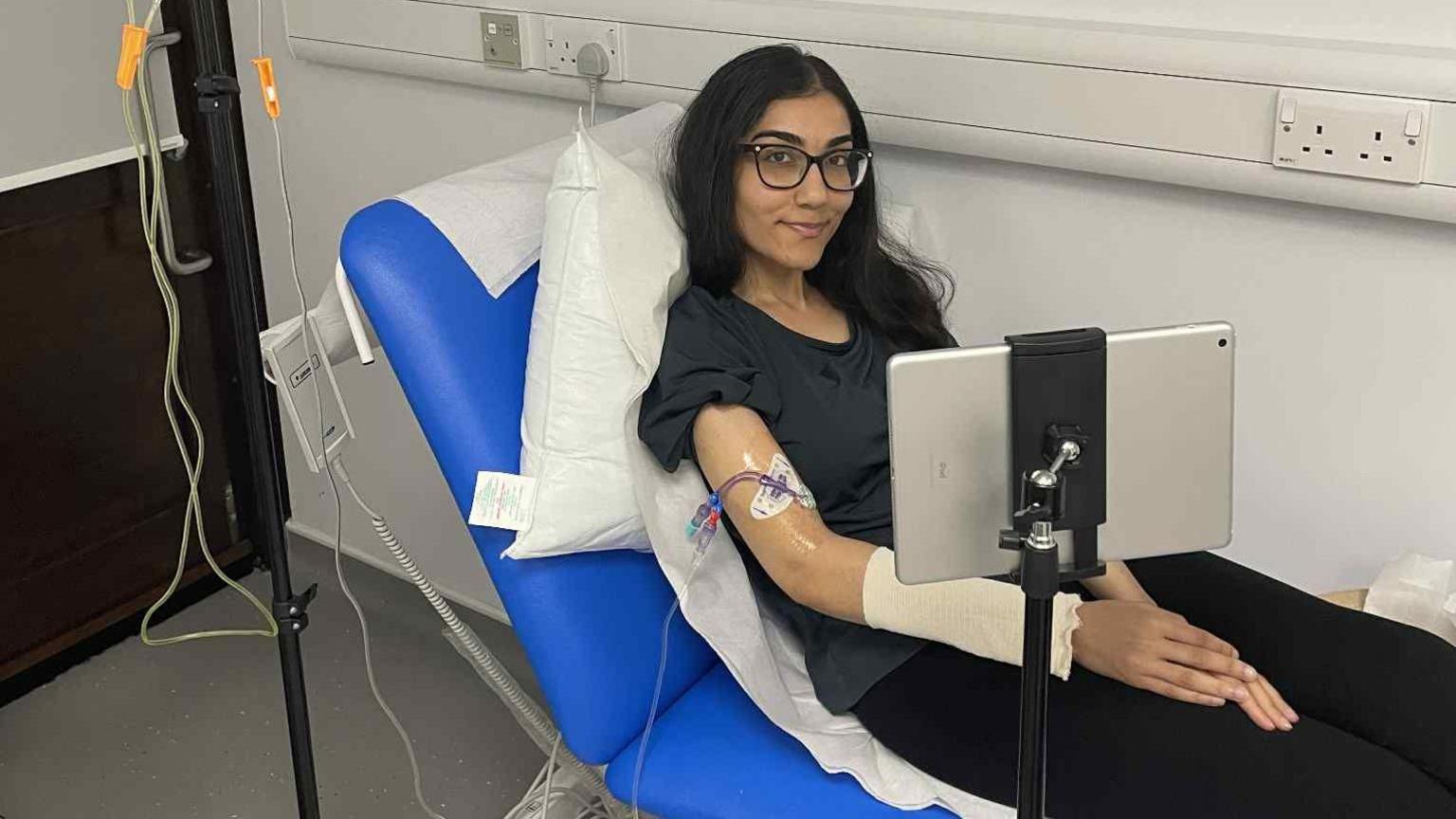'Bite left me bedbound and turned my head to mush'

Dan Duerden's Lyme Disease left him bed-ridden and unable to work for 15 months
- Published
Dan Duerden was 22 when he developed a rash on his elbow during a busy sheep shearing season.
Believing it was just ringworm, Dan said he was "not as worried as I should have been" and brushed off concerns that it could have been Lyme disease.
But within a few months, Dan, from Barrowford in Lancashire, found himself unable to get out of bed.
The now-26-year-old would find himself unable to work for more than 15 months after finding he had contracted the tick-borne infection.
He said at first he had "Googled the symptoms and thought 'I'm glad I don't have that'".
"But I started getting ill. I went to the hospital for a test but it came back negative. I found that I was starting to feel worse for wear.
"The rash was gone but then I was struggling to move my hands. It was still in the back of my head about Lyme disease so I looked into it a bit more and I knew that these were the symptoms."
'Shell of who you were'
Lyme disease is an infection caused by the Borrelia burgdorfer bacteria, which is carried by parasitic ticks.
Symptoms such as fatigue and headaches, high temperature and joint pain can come within days or weeks of being bitten, the NHS says.
But rashes can take up to several months to appear.
Initial tests came back negative, but Dan's worsening symptoms meant he was given a six-week course of antibiotics.
"A couple of months later I was feeling a lot better," Dan said.
"Then I started to have one day a week where I felt a bit flat. From there I went even worse. I was bedbound. I didn't think I would get through and out the other side at one point.
"The worst part was that my head went to a big pile of mush. I was struggling to think or do anything. The exhaustion is like running a marathon every day."
A subsequent test taken privately finally picked up the infection, and another 26-week course of antibiotics was given.
Dan started to make a slow recovery, but said that this summer was the first since he contracted the illness that he had been able to function properly.
Despite knowing that he likely contracted the disease from a tick, Dan never saw one on his body and did not remove one from his skin.
"The worst thing and best thing about Lyme disease is that it doesn't kill you," he added.
"It just debilitates you. It strips you of who you are and what you are. It makes you a shell of who you were before.
"I know some awful stories. I have been really, really lucky."
Awareness
According to charity Lyme Disease UK, the true rate of Lyme disease in the UK is unknown because the cases recorded are only those confirmed by blood tests which identify antibodies, not an active infection.
The figures do not include diagnoses made based on the identification of the Erythema Migrans - or bullseye rash.
However, according to figures released by the UKHSA in 2024, there were 882 acute cases of Lyme disease between April and September in 2023, compared to 635 the previous year.
Concerns have been raised by Lyme Disease UK over a lack of awareness of the condition among the public and health professionals, with "prompt treatment and prevention" cited as major factors in reducing serious disease.

Sophie Akhtar says she spent years trying to find an answer as to why she was ill
Sophie Akhtar, from Accrington, had "no idea" she had the infection until she was hit with debilitating symptoms.
The 26-year-old initially fell ill after reacting to a Covid vaccination in December 2021, deteriorating over the course of several weeks.
Following a period of illness and a fruitless series of investigations with the NHS, she sought private treatment at a long Covid clinic in London, where she was subsequently tested for and diagnosed with Lyme disease.
Sophie, who had moved to London prior to her diagnosis to pursue an MA in mental health psychological therapy, said: "I was getting extreme pain in my head, I lost my ability to walk properly.
"I got weakness in my legs, weakness in the left side of my body, my heart would go crazy and I started to get allergic to everything."
In the two and a half years it took Sophie to receive her diagnosis, she was forced to postpone her studies and had to quit work due to her worsening condition.
"I spent years trying to find an answer," she added.
"I became completely bedbound. My partner became my carer. Before it we were planning our lives together."
After saving up their money for a seven-week course of IV antibiotics at the clinic, Sophie and her partner travelled for two hours into Central London each day for her treatment.
Sophie said she initially experienced an improvement and was able to complete her studies, but the level of bacteria in her blood quickly rose again and her symptoms returned.
"I get pain in my head, I'm chronically fatigued and Lyme disease even causes emotional symptoms," she said.
"There isn't much awareness of it though. At one point I ended up in A&E and the nurses hadn't heard of it.
"Before I was diagnosed, I went to the doctors with these symptoms and Lyme disease didn't even come to their minds."
Sophie is now saving to undergo a second round of IV antibiotics, which she hopes will be enough to clear the bacteria from her body entirely.
What the NHS says
According to the NHS, not all ticks in England carry the bacteria that causes Lyme disease.
But the NHS England website warns that it is "still important to be aware of ticks and to safely remove them as soon as possible, just in case.
"Ticks that may cause Lyme disease are found all over the UK, but high-risk places include grassy and wooded areas in southern England and the Scottish Highlands".
It adds: "You can reduce your risk of getting Lyme disease by avoiding tick bites and removing the tick quickly if you do get bitten.
People who discover a tick on their skin should "use fine-tipped tweezers or a tick-removal tool, grasp the tick as close to the skin as possible and slowly pull it upwards".
They should be careful not to squeeze or crush it, dispose of it, then clean the bite with antiseptic or soap and water, NHS England adds.
Get in touch
Tell us which stories we should cover in Lancashire
Listen to the best of BBC Radio Lancashire on Sounds and follow BBC Lancashire on Facebook, external, X, external and Instagram, external. You can also send story ideas via Whatsapp to 0808 100 2230.